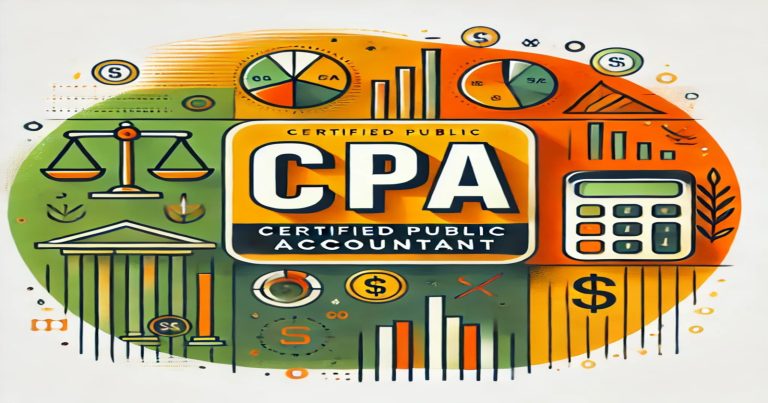The term CPA stands for Certified Public Accountant, a qualification recognized worldwide, opening multiple avenues in accounting and finance. The CPA qualification is the hallmark that reflects professional expertise in all aspects of financial reporting, auditing, taxation, and other fields of accounting. The course provides an opportunity to work globally in the accounting and finance sectors. With a structured syllabus, well-defined eligibility, and substantial earning potential, CPA certification offers unmatched advantages for Indian students aspiring to excel in accounting professions.
What is a CPA?
One of the most prominent certifications for accountants is CPA USA, especially in the United States. The American Institute of Certified Public Accountants, or AICPA, is the governing body that issues this certification, signifying a professional’s mastery over accounting principles, auditing, taxation, and financial planning. Such a certification is essential for one who wants to practice as a licensed accountant in the United States or work for any global corporation with U.S.-based financial operations.
The full form of CPA is Certified Public Accountant. A CPA serves a role similar to a chartered accountant in India but focuses heavily on U.S. GAAP (Generally Accepted Accounting Principles), IFRS (International Financial Reporting Standards), and U.S. taxation laws.
Role and Responsibility of CPA
A Certified Public Accountant, or CPA, is a professional with advanced qualifications in the financial world responsible for a broad range of functions, from purely financial to auditing and advisory roles. Beyond the bookkeeping stage, their function involves areas like tax compliance, financial strategy, and adherence to regulations. CPAs ensure the health of businesses and individuals by keeping the finances transparent, accurate, and legal in their reporting.
- Financial Auditing and Reporting: Conduct detailed audits to report without errors in the financial statements. Check for compliance with standards such as GAAP and IFRS. Uncover financial errors, fraud, or inefficiency.
- Tax Compliance and Planning: Prepare and file income, corporate, and other tax returns. Instruct clients on strategies to decrease taxes. Defend clients during audits or tax authority disputes.
- Management Accounting: Analyzing financial data to allow strategic business decisions. Presentation of budgetary estimates, forecasts, and other performance measures. Support in determining investment opportunities.
- Advisory Services: In mergers, acquisitions, or restructuring: Provide knowledge and advice to a business setting up internal controls and financial systems. Provide insight and support into adopting and automating financial software.
- Compliance with Regulations: Ensure businesses remain in compliance with the legal and financial reporting requirements. Update the client on new changes in tax laws and regulations. Support to help maintain AML rules.
CPA Fees
The CPA course fees involve several costs that candidates need to plan for in advance. Indian students must budget for exam fees, application charges, study materials, and international testing expenses. These fees are essential to complete the exam process and gain official CPA recognition to practice professionally.
- Exam Fees: The CPA exam includes four sections, and each section has a fee. Indian students need to pay between ₹16,000 and ₹20,000 for one section. This means the total cost for all four sections is approximately ₹64,000 to ₹80,000. These fees are mandatory and cover the cost of appearing for the exam.
- Application Fees: Every student must apply through a U.S. state board to take the CPA exam. Application fees typically range between ₹8,000 to ₹12,000. The exact fee depends on the state board you choose.
- Course Material Costs: CPA preparation requires high-quality study materials or review courses. These courses generally cost between ₹50,000 to ₹1,50,000.
- International Testing Fees: Indian students who take the CPA exam at an international test center must pay an additional fee. This fee is between ₹80,000 and ₹1,20,000.
- Evaluation Fees: Indian students need to evaluate their academic credentials according to U.S. standards. The evaluation process costs between ₹8,000 and ₹24,000. It is a one-time payment and is mandatory to verify that your degree aligns with the eligibility criteria set by U.S. state boards.
- Licensing Fees: After clearing the CPA exam, you have to apply for a CPA license. Licensing fees are between ₹4,000 and ₹40,000. This fee will ensure that you are officially recognized as a CPA and will be able to practice professionally.
| Expense | Cost (INR) | Description |
| Exam Fees | ₹16,000 – ₹20,000/section | ₹64,000 – ₹80,000 for all 4 sections. Mandatory. |
| Application Fees | ₹8,000 – ₹12,000 | Paid to U.S. State Board for registration. |
| Course Materials | ₹50,000 – ₹1,50,000 | Study materials for exam preparation. |
| International Testing | ₹80,000 – ₹1,20,000 | The fee for taking the exam outside the U.S. |
| Evaluation Fees | ₹8,000 – ₹24,000 | To check if your degree meets U.S. standards. |
| Licensing Fees | ₹4,000 – ₹40,000 | For obtaining CPA certification after passing. |
CPA USA Course Duration
The CPA course duration is usually completed within 18-24 months for most candidates. This is determined by individual preparation and exam schedules. Candidates can prepare for the four sections using a structured approach, covering auditing, financial accounting, business concepts, and regulation.
- Preparation Time: On average, candidates take 18-24 months or it can range 3-4 years to prepare for and complete all four sections of the CPA exam.
- Exam Structure: The CPA exam has four sections:
- Auditing and Attestation (AUD)
- Business Environment and Concepts (BEC)
- Financial Accounting and Reporting (FAR)
- Regulation (REG)
CPA Eligibility
The CPA exam is a globally recognized certification that requires candidates to meet specific eligibility criteria and master a detailed syllabus. Indian students aspiring to become CPAs must fulfill academic and experience requirements while preparing for the four challenging sections of the CPA exam, covering diverse topics like auditing, taxation, and financial reporting.
To qualify for the CPA exam, Indian students need to meet specific CPA eligibility criteria. The primary academic requirement is a Bachelor’s degree in commerce or accounting. Students must also accumulate 120-150 credit hours in accounting or related subjects, as evaluated by U.S. education standards. For Indian students, a CA qualification often fulfills these credit requirements, making them eligible to apply for the exam.
In addition to academic qualifications, some U.S. states may require candidates to gain professional experience. Typically, this involves completing one year of work under a licensed CPA. This combination of education and experience ensures that candidates possess the necessary skills and knowledge to pursue a career as a CPA.
How to Become CPA in India?
In India, becoming a CPA requires a person to satisfy the requirements by the American Institute of Certified Public Accountants (AICPA). This global certification enables individuals to enhance their careers in accounting, finance, and auditing. Here is the step-by-step process for attaining the CPA designation in India:
- Eligibility to Sit for the CPA Exam
To sit for the CPA exam, a candidate must fulfill the following educational and professional eligibility requirements:
- Educational Requirements: Bachelor’s degree in accounting or a related field like finance. Normally, 120-150 credit hours of college-level coursework are equivalent to a master’s degree in India.
- Professional Experience: Generally, at least 1-2 years of work experience in most U.S. states under a licensed CPA after passing the exam for certification.
- Select the Right Jurisdiction
The CPA license is granted by state boards of accountancy in individual U.S. states, with their own set of eligibility requirements. Indian applicants must choose a state board that suits their credentials (for example, credit hours or specific topics). - Get Ready for the CPA Exam
The CPA exam is divided into four sections. Candidates have an 18-month window to complete the sections:
- Auditing and Attestation (AUD): The section deals with auditing procedures, ethics, and reporting.
- Business Environment and Concepts (BEC): It deals with corporate governance, economic concepts, and IT.
- Financial Accounting and Reporting (FAR): It focuses on U.S. GAAP and IFRS.
- Regulation (REG): It deals with tax laws, business law, and ethics.
- Registration and Scheduling the CPA Exam
Register with the National Association of State Boards of Accountancy (NASBA) for the CPA exam.
Pay the fees for the exams and receive a Notice to Schedule (NTS). Select a Prometric testing center in India, preferably located in Delhi, Mumbai, Bangalore, Hyderabad, or Chennai. - Pass the CPA Exam
Obtain a minimum score of 75 in each section. Schedule your preparation by focusing on one section at a time. - Meet Licensing Qualifications
Upon passing the CPA exam, there are further requirements to be licensed as a CPA: Accumulate professional experience under a licensed CPA. In some states, one may be required to take an Ethics Exam or other courses.
- Maintain the CPA License
A CPA is obliged to take continuing professional education (CPE) credits every year to keep his license. It ensures that CPAs are aware of the changes in accounting practices and regulations.
US CPA Syllabus
The CPA syllabus is designed to test a candidate’s expertise in various areas of accounting, auditing, and taxation. It is divided into four key sections, each covering essential topics like ethics, corporate governance, financial reporting, and federal taxation.
- Auditing and Attestation (AUD): Ethics, professional responsibilities, and general principles. Risk assessment and planning. Performing audit procedures. Reporting.
- Business Environment and Concepts (BEC): Corporate governance. Economic concepts and analysis. Financial management. IT and operations management.
- Financial Accounting and Reporting (FAR): U.S. GAAP framework. Financial statement presentation. Accounting for governmental and not-for-profit entities. Measurement, recognition, and disclosure of business transactions.
- Regulation (REG): Federal taxation. Business law. Ethics and professional responsibilities.
| CPA Exam Section | Key Topics Covered |
| Auditing and Attestations (AUD) | Ethics, Professional Responsibilities, and General Principles |
| Risk Assessment and Planning a Response | |
| Performing Procedures and Gathering Evidence | |
| Conclusions and Reporting | |
| Financial Accounting and Reporting (FAR) | Conceptual Framework, Standard |
| Setting, and Financial Reporting | |
| Financial Statement Accounts and Transactions | |
| State and Local Government Accounting | |
| Regulations (REG) | Ethics, Professional Responsibilities, and Federal Tax Procedures |
| Federal Taxation of Property, Individuals, and Entities | |
| Business Law and Legal Responsibilities | |
| Business Environment and Concepts (BEC) | Economics and Financial Management |
| Information Technology and Operations Management | |
| Enterprise Risk Management and Internal Controls |
CPA Exam Pattern
The CPA test is computer-based, four-part, and 16-hour. It is designed to test knowledge and competencies that would eventually lead to the acquisition of a Certified Public Accountant title. The test is held at designated centers all over the world; however, each candidate gets the same format for the test.
The exam is in English, and it consists of MCQs, task-based simulations, and written communication tasks. One needs to get at least 75 on a scale of 0–99 to pass. They have to complete all four parts within 18 months to become eligible for the CPA license.
The CPA exam is open to registration throughout the year, so candidates can sign up at any time. The following is an overview of the exam format for Indian CPA aspirants:
| CPA Paper | Duration | CPA Course Details |
| Paper-1 | 4 hours | Auditing and Attestation (AUD) |
| Paper-2 | 4 hours | Financial Accounting and Reporting (FAR) |
| Paper-3 | 4 hours | Regulation (REG) |
| Paper-4 | 4 hours | Business Environment and Concepts (BEC) |
CPA Exam Structure
The CPA exam is divided into three main sections, mainly consisting of written communication, task-based simulations, and MCQs. Task-based simulations contribute heavily to testing the candidate’s skills.
Except for the BEC section, both MCQs and simulations have equal weightage. For most sections, 50 percent marks are awarded for MCQs and the remaining 50 percent marks are given for simulations. For the BEC section, there are written communication tasks, which amount to 15 percent of the marks.
| Section | MCQs | Task-Based Simulations (TBSs) | Written Communication Tasks (WCT) |
| Auditing (AUD) | 50% | 50% | Not Applicable (NA) |
| Business (BEC) | 50% | 35% | 15% |
| Financial (FAR) | 50% | 50% | NA |
| Regulation (REG) | 50% | 50% | NA |
CPA Exemptions
Some candidates are exempted based on their qualifications and scores. These exemptions enable candidates to skip certain papers or requirements, making the CPA journey easier for them.
- CA/CMA Final Candidates: If you scored 50 or above in your final exams, you qualify for paper-by-paper exemptions. This means you are considered to have passed the corresponding CPA exams.
- Certified CA/CMA Members: Fully exempt from all training requirements.
- For CA/CMA Intermediate Students: Exempted from the AFAE and BRLC subjects respectively.
- For the students who are CS Qualified Candidates: They have an exemption from examinations under Business Law and Tax Law.
- Chartered Tax Practitioners: Automatically exempted from the first four exams. These candidates only need to clear the final four exams for qualification.
- ACCA Advanced Diploma Holders or Affiliates/Members: Need to appear for special exams on Indian Taxation Laws, Business Laws, and Indian GAAP to gain the CPA/CTPr award.
Note: Whereas these exemptions lighten the process, all other mandated requirements must still be met for the CPA designation.
CPA Salary in India
The salary of CPAs in India is extremely competitive because the world needs the expertise of such professionals. In entry-level positions, CPAs can expect between ₹6 to ₹10 LPA. Generally, these professionals work as financial analysts, auditors, or tax consultants. Such job profiles are the best for training and developing knowledge in finance and accountancy.
CPAs at higher experience levels earn highly as well. Controller or senior audit positions for a multinational corporation, mid-level CPAs would range between ₹10 to ₹20 LPA. More experience adds up to more dollars, the experience CPAs get could earn anywhere in the bracket of ₹20 to ₹35 LPA, plus. It includes leadership jobs in top companies: CFO, forensic accountant, and strategy consultants; Big 4 firms do too.
These salaries can vary from company to company concerning role and responsibility and company size.
| Job Profile | Job Description | Average Salary (INR) |
| Accountant | Manage financial records, and prepare taxes, and audits. | ₹5 – ₹8 LPA |
| Auditor | Verify the accuracy and compliance of financial reports. | ₹6 – ₹9 LPA |
| Forensic Accountant | Investigate fraud and financial irregularities. | ₹9 – ₹15 LPA |
| Management Accountant | Assist in budgeting and strategic financial planning. | ₹6 – ₹10 LPA |
| Tax Consultant | Provide tax-saving strategies and ensure compliance. | ₹6 – ₹10 LPA |
CPA FAQs
What is the full form of CPA?
CPA stands for Certified Public Accountant.
What is the fee for the CPA course for Indian students?
The total cost, including exam fees, international testing fees, and study material, ranges from ₹50k-₹2 lakh.
How long does the CPA course take?
The CPA course usually takes 18-24 months or 3-4 years to complete, including preparation and passing all four exam sections.
Is CPA better than CA in India?
Although CA has a focus on Indian taxation and laws, the CPA is recognized globally and provides an edge for professionals looking to work with multinational firms or organizations based in the U.S.
What is the freshers salary for CPAs in India?
Freshers CPAs make ₹6-₹10 LPA and have exposure to fast growth opportunities.



